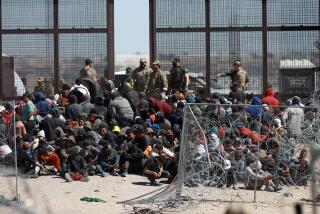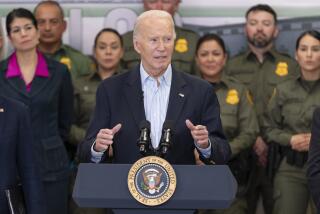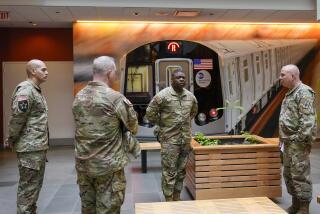700 National Guard Troops, Minus Guns, Will Bolster Security at Canadian Border
More than 700 National Guard troops will begin patrolling the U.S.-Canadian border within the next several weeks as part of a major campaign to gird the nation against possible terrorist attacks, officials said Tuesday.
Authorities plan to combine the influx of National Guard personnel with a proposed $1.1-billion plan for ratcheting up immigration safeguards, Atty. Gen. John Ashcroft told members of a Senate panel. But his vision for how law enforcement should work in the age of anti-terrorism came under fire from Democratic lawmakers who accused him of doing too little, too late.
In a confrontational scene that was more reminiscent of Ashcroft’s bruising confirmation battle than of the more recent, post-Sept. 11 climate of political unity, lawmakers attacked Ashcroft on everything from immigration to Enron Corp.
Democrats wanted to know why the National Guard troops being put in place on the Canadian border won’t be carrying guns, why the Bush administration is moving to cut hundreds of millions of dollars in funds for local street cops, why it is relinquishing control of some terrorist response plans to the Federal Emergency Management Agency and why Ashcroft refuses to bring in an outside counsel to investigate the Enron scandal.
The Justice Department’s handling of the Enron issue proved to be a particular sore spot, as Ashcroft withstood tough questioning from senators on both sides of the political aisle.
Ashcroft has recused himself from the Justice Department’s investigation into the Enron affair because of political contributions he received from former Chairman Kenneth L. Lay and other executives while Ashcroft was a U.S. senator. Virtually the entire U.S. attorney’s office in Houston is also recused from the case because of Enron connections.
Ashcroft named his chief deputy, Larry Thompson, to oversee the Enron investigation. But a growing chorus of Democrats in Congress has suggested in recent weeks that Thompson may have the appearance of a conflict because his former law firm in Atlanta represented both Enron and Andersen, the accounting giant implicated in the alleged destruction of Enron documents.
Sen. Ernest F. Hollings (D-S.C.), chairman of the appropriations subcommittee that held Tuesday’s hearing, commended Ashcroft for recusing himself from the case in order to avoid any possible tainting of the criminal probe. But he urged Ashcroft to appoint an outside counsel, saying that with Thompson in charge, “the appearance of a conflict is still there, just like yourself.”
Ashcroft refused to discuss the matter under repeated questioning from Hollings and others. The logjam prompted an exacerbated Hollings to declare that the attorney general’s silence “almost sounds like the 5th Amendment these guys [from Enron] are taking. . . . You can’t recuse yourself from reality. You’ve got to get with the program and make a decision.”
The Justice Department reaffirmed its stance after the hearing.
“Everyone working on the Enron matter at the Justice Department has every confidence in the independence and absolute integrity of Deputy Atty. Gen. Larry Thompson. There is no basis for the deputy attorney general not to fulfill his duties and responsibilities in this matter,” said department spokeswoman Barbara Comstock.
The Enron questioning was a distraction from the business at hand for the attorney general: securing more money in next year’s federal budget to fight terrorism.
A key front in that battle, Ashcroft said, will be toughening the nation’s borders through $856 million worth of proposed improvements in the immigration system, in addition to $187 million funded by Congress in the wake of the Sept. 11 attacks.
Ashcroft said there is a “new and urgent” need for bolstering immigration defenses and other homeland security. The increased immigration funding would go toward beefing up patrol forces on the nation’s borders, strengthening intelligence-gathering and technology systems, reducing the numbers of illegal immigrants and building new border facilities.
The most immediate push will come on the Canadian border, with the assignment of the 700 National Guard troops beginning in the next few weeks, Ashcroft said.
Under a temporary six-month assignment, the troops are expected to provide support for border forces in air operations, cargo inspections, traffic management, pedestrian control and administrative services in an effort to head off terrorist threats. Canada has been home to several Islamic terrorist cells dating back to at least the mid-1990s, with an Al Qaeda-trained terrorist from Montreal stopped north of Seattle in 1999 before he could carry out a plot to bomb Los Angeles International Airport.
Sens. Patty Murray (D-Wash.) and Patrick J. Leahy (D-Vt.) questioned why it has taken so long to get northern border agents the relief they need--especially when security-related delays are putting a strain on commerce in northern states.
Murray said she was also concerned that the National Guard troops will not be armed, which could “severely limit their ability to guard the border.”
Ashcroft said that decision grew out of the fact that the United States does not want to “militarize” the border. “Our friends in Canada are appropriately sensitive that we don’t signal that we are somehow arming the border,” he said.
Meanwhile, at a separate Senate hearing, several lawmakers said they are convinced that the nation’s ports remain vulnerable.
“There is much more we can do to ensure the safety and integrity of our seaports and the communities surrounding them,” Sen. Dianne Feinstein (D-Calif.) said, noting that virtually none of the cargo containers shipped to the United States undergo inspections. A small percentage are examined after their arrival.
Richard Steinke, executive director of the Port of Long Beach, called for increased funding for both ports and federal agencies but he said stepped-up security plans must be developed at the local level.
“Because each port has unique characteristics, a one-size-fits-all approach does not work,” said Steinke, who is also head of the American Assn. of Port Authorities.
More to Read
Start your day right
Sign up for Essential California for news, features and recommendations from the L.A. Times and beyond in your inbox six days a week.
You may occasionally receive promotional content from the Los Angeles Times.






